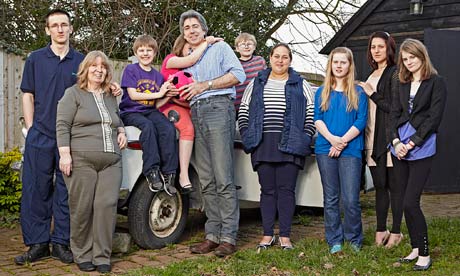I was really moved by last night’s BBC 2 documentary featuring traumatised Maisie, who at 8 years-old had two failed adoptions behind her and was desperate to belong to a family.
At first I thought the programme was too intrusive as therapists probed and opened up wounds about her troubled past, I felt that the visible distress this caused should have remained private.
But then how would those of us with our comfortable lives know anything about this kind of raw suffering? Young children born into violent and dysfunctional homes don’t deserve their their traumatic lives. Thank God for big-hearted, adoptive parents like Jim and Sue who nurtured and loved Maisie, finally offering her the family home she longed for, even though they have adopted eight other children. Jim and Sue know they face many more challenges with Maisie, people like them are the backbone of our society today.
The programme reminded me of Francesca Polini who adopted two babies from Mexico for humanitarian reasons, and this week described what it felt like to be an adoptive parent on her blog. These are people who make a real difference to our society by their selfless actions, and to the lives of disadvantaged children, by providing them with unconditional love and stability; it’s all a child ever needs in life.
With Mother’s Day only just behind us, let’s ponder on Francesca’s thoughts of being an adoptive mother:
Gaia, my adopted daughter turned three last week. Just a few days later I celebrated Mother’s Day with both of my adopted children for the first time. Invariably people close, and not so close, will ask me how it feels on occasions like this. What they’re angling at, of course, is whether I think about my children’s ‘real’ mothers.
This is what I know. I know that though I am not their birth mother, I am their real mother. It feels pretty real to feed and dress them, nurse them when they’re sick at night, watch them walk and grow. I am the one who takes them to nursery and wonders if it is right for them. I think about their future; about school, possible bullying, their interactions with other children and adults. I plan birthdays and picnics and feel my heart skip a beat if I think anything is wrong with either of them. I laugh (a lot) and if I go away with my husband overnight I miss them and rush through the front door to make sure all is well. As it should be.
Meanwhile I am very aware of the birth mothers, the women who carried them. I make sure they also know it by reading special stories to them, by telling them their life stories before we came into their lives. I know that the mothers will think of them on their birthdays, and that is just the way it is. But, like other adoptive parents, I have to be careful. There is far too much complexity to happily say, “oh wouldn’t it be nice to have them in contact with their birth mothers for occasions like this one.†Whatever I choose to tell them, and however we decide to manage this complex issue where there is no such a thing as doing the ‘right thing’,  our children have one mother and one father.
In our case, the women who gave up their babies did so not because they couldn’t afford them, but because adoption was the only way out of their respective situations. For their own reasons, they could not have these babies with them – ever. They had a plan for them, as all the mothers who were at the VIFAC Institute in Mexico did.
That is why they were there. They were not in a public hospital, laying there, undecided. They knew the Institute would ensure their children were adopted by a good family and had requested no further contact. This may sound odd to people who simply can’t envisage it, but they wanted to cut ties and leave.
There is no ideal way to do adoption, However, if they’d been abandoned or neglected until they ended up in the system, they may well have been stuck there. Rick and I don’t kid ourselves that we are birth parents. Why would we? But that doesn’t make our ties any weaker.
Pragmatism aside, yes there are days when I would love to reassure Gaia’s mother that this tiny baby has grown into an independent, strong, happy and laughing three-year-old. I would love to introduce her to Gaia’s friends and grandparents and show that she has established a life and now has a sibling to look after (and annoy).
On Gaia’s birthday she did as she has the previous year: she lay in her bed, in her relaxed, undeniably Mexican pose with her hands behind her head waiting for us. We came in with gifts, hugs, kisses and songs. It is our routine and one I hope that my children will have for a long, long time. I am so proud to be a mother and grateful that we are in a position to make a child’s hopes and dreams happen.
Gaia and her new brother Luca have a family who love them unconditionally and feel fortunate to have them. That is how real adoption feels. That is what being an adoptive parent feels like.
•You can watch A Home for Maisie on iPlayer.

This has been a very significant blog indeed. I’ve acquired a lot of helpful information from your article. Thank you for sharing such relevant topic with us.